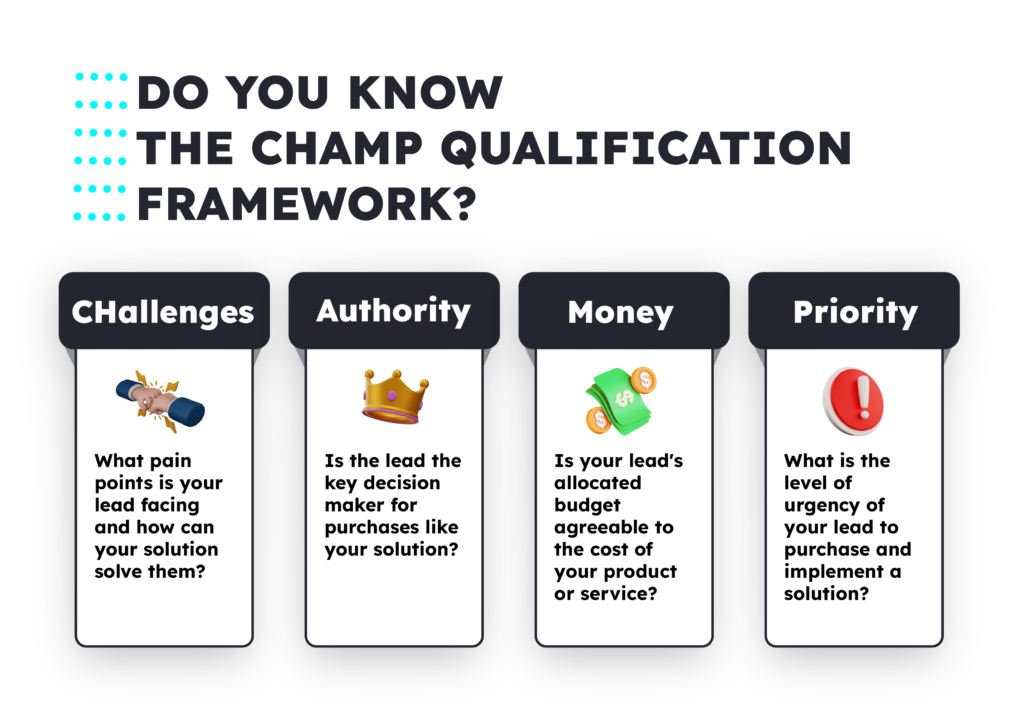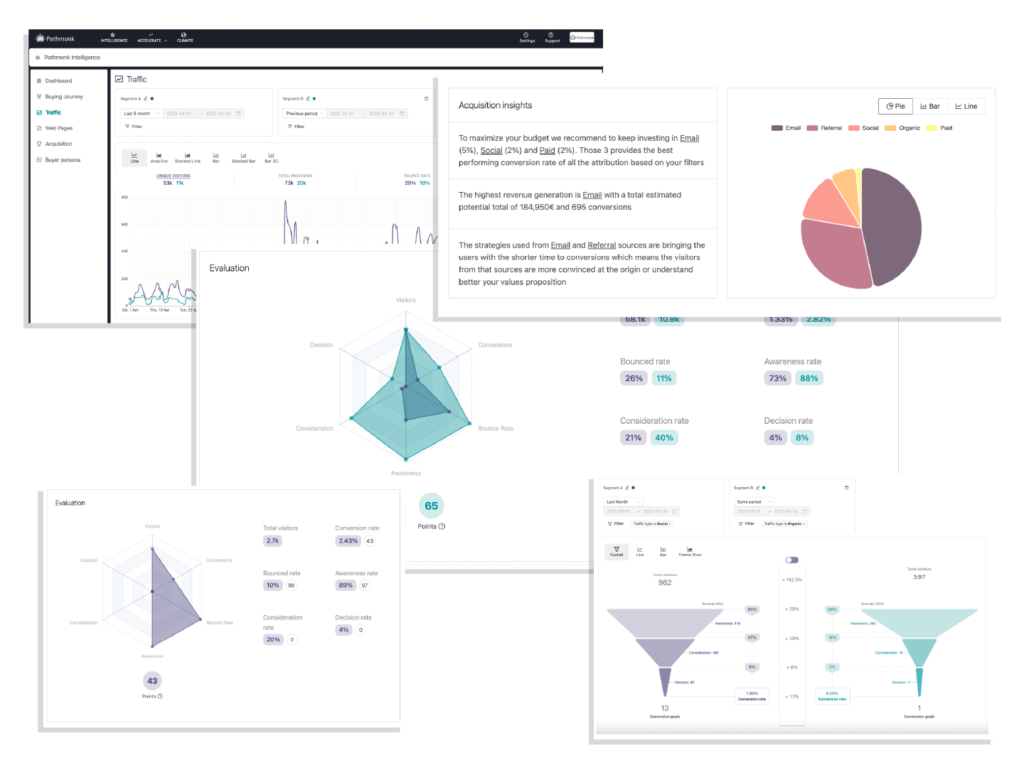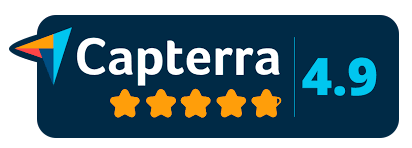What is the CHAMP Qualification Framework?


With so many different acronyms used in sales to evaluate the potential of leads, it’s no wonder you might be lost. To help sales teams narrow down or rank leads according to buying potential, there are different strategies that companies will use to rank or qualify those leads. One strategy is the CHAMP qualification framework.
Why should you qualify leads?
A lead is a company or person that is a potential customer for your products or services. You can find them in many different ways, but not every lead will become a paying customer.
The process of qualifying a lead is going to vary between companies. Since few companies offer exactly the same products or services and run their companies differently, each needs its own modified way to qualify a lead. For example, if two companies are both selling feather pillows, they will still differ in many ways, like variety of products and budgetary needs. Even if the target market is the same for competing companies, there are differences to consider.
Some of the best-known acronyms for the qualification process are BANT (Budget, Authority, Need, Timing) and PACTT (pain, authority, consequence, target profile, and timing). Each focuses on certain aspects of a business or person to decide if the lead is worth pursuing. No one likes wasting their time and money trying to get a potential customer to purchase if that potential customer has no intention of buying. On the end of the spectrum, you don’t want to lose a lead that could have been a profitable partnership.
By qualifying a lead, you can help your sales team focus on the best leads. When less money and time are spent on the less qualified leads, your company can become more profitable. And this is where the CHAMP framework will be of help!
The CHAMP Qualification Framework
The CHAMP acronym stands for CHallenges, Authority, Money, and Prioritization. Each one is a critical piece of qualifying leads to see how likely it is that they will become paying customers.

CHallenges
Opportunities are often disguised as challenges. Salespeople know that perspective is everything and how you approach it can make or break a deal.
In this framework, challenges are given a hyperfocus. They are the first consideration when looking at a potential customer because they are what all the decisions hinge on.

The entire pitch of a campaign can be based around specific challenges.
The first way to work around challenges is to identify them. Once identified, an opportunity is created. Asking the right questions can help discover what the most pressing issues are for a lead.
Here are some of the best probing questions:
- What challenges is the company currently facing?
- How long has this problem been happening?
- What would it look like to solve this problem? Would processes change?
- What solutions have already been tried to solve the problem?
- What will happen is the issue isn’t solved?
When the biggest problems are identified, the sales team can work on a strategy to address them. Remember, you are looking for an opportunity in the challenges. If you identify challenges you can help with, the lead becomes more qualified.
Authority

Authority is mentioned in almost every sales acronym. It’s important to talk to the person or people in charge of buying when making a sales pitch. Nurturing a lead takes a lot of time, money, and effort, so do not chase a lead who cannot purchase your product or service. Otherwise, you will have to start over once you find the right person and you will have wasted your time and resources.
Each company or organization has its way of authorizing contracts or buying. Some companies have a board that must approve big purchases or changing contracts while others give it to a person in HR to handle. It is important to verify the right contact before investing too much into a lead.
Selling to individuals also has aspects of authority to verify. For example, trying to sell a product or service that involves a home requires talking to the homeowner. Renters and other adults living in the house do not usually have the authority to sign contracts for solar panels, lawn services, or other similar areas.
Although you want to talk to the person or people with authority, you mustn’t neglect low-influencing leads. Someone who seems low-influencing can still help get a foot in the door or put in a good word. People without buying authority can also be privy to important information like how to best approach a person and difficulties in a department.
Money

One of the most sensitive topics for people and companies is money. It’s also vital to discuss when buying products. In BANT, budget is the first criterion and sets the tone for the entire conversation. Money is important, but CHAMP places it further back for a time to warm up to the idea.
With more time to discover the lead’s challenges, salespeople can frame the money discussion in a way that shows the benefits of spending some money to deal with their problem. Instead, ask questions that inspire them to look for the money by asking probing questions like:
- Do you already have the budget for this area?
- Can you ask for a budget for this investment?
- Is there a typical process for getting approval for this type of purchase?
Your job is not to look over their budget and find the money. Beyond these questions, you should be showing the benefits of investing in your offering by talking about relieving the pain points and increasing ROI.
Prioritization

Similar to timing in BANT, it’s important to know what timeline your lead is working on. Prioritization focuses on the priorities of the company. If you know that your challenge is low on the list of priorities, this puts the lead qualification low on the list for your priorities.
Stay up-to-date on the industry news. Changes to protocols or updating procedures can bump a need higher up on the priority list. If you are ready for a sudden need for your product or service, you have a good chance of gaining a customer.
An important part of gauging priority ranking is being realistic. Try to gauge a realistic timeline from your conversations instead of focusing on the timeline priority that you want to have happen. Pushing your timeline onto a potential customer makes you look too aggressive, so qualify based on reality.
How CHAMP differs from BANT
BANT was one of the first qualification systems that became popular among sales departments. CHAMP is very similar to BANT, but it has two key differences; the viewing of challenges and timing taking a lesser role in prioritization.
Challenges
Challenges are something many frameworks look at, but CHAMP places them as a top priority. Yes, challenges should be examined before a budget’s constraints. This point of view helps discover unique opportunities to engage with a lead, showing how to relieve some pain points. Looking at challenges as a way to more accurately qualify a lead helps more accurately qualify them on your list.
Not all challenges are created equal. Some will take a lead further down your priority list while others can bump them up. If your product or service can alleviate some of the challenges, it is worth addressing in a demo or presentation. Everything surrounding challenges is just how you look at it and what you think the prospect needs.
Looking at budget first may take some great opportunities out of your consideration because it would have disqualified them. By placing more emphasis on challenges first, you open up more potential sales because you can address them with the budget instead.
Timing
Timing is important, but it does not always take potential out of the running. It’s important to consider their contracts and budget renewals, but other timing issues are relevant for different industries.
For example, changes are made in compliance requirements during random times of the year. Some government agencies will give an end-of-year date to be compliant, but this does not always match with contracts.
If you are a company that specializes in computer software for police officers and their databases need to be updated by mid-September, you would have a lot of potential business leading up to that date, not just when the contract expires for their current software company.
When a business is on the line or there is an opportunity to take their company to a higher level of function, contracts can be canceled, and new ones signed. Do not overlook an opportunity just because they are already under contract and your view is bad from the outside.
Another factor to take into account is the repercussions of breaching a contract. On your part, the business you’re selling might allocate funds to facilitate the buyout of individuals’ contracts. This is a viable choice for certain sales teams that are confident they’ll gain more than they’ll lose in the transaction. It’s crucial to have all the relevant information before ruling out a potential customer to ensure accurate lead qualification.
As you can see, timing is a puzzle piece rather than a landmark. It is important to take a closer look at how it fits into the overall picture of qualifying rather than just making it a make-or-break point.
Giving CHAMP a Try
Sales teams have a great ability to adapt to new strategies. Trying new techniques and being creative is where salespeople shine. The CHAMP qualification framework is a great way to prioritize the best leads that your team is bringing in.
If you are looking for a better way to channel all your leads, increase ROI, and make more progress, CHAMP is worth a try.
Intuitive Cookieless Analytics for Your Web
Understand your customer journey, find drop-offs, and receive actionable insights with AI.






